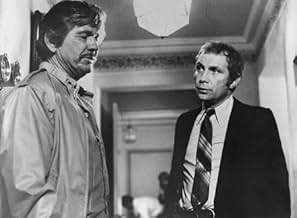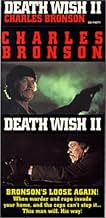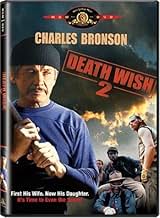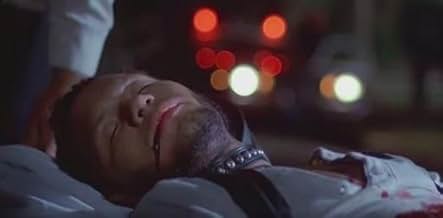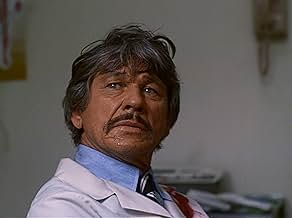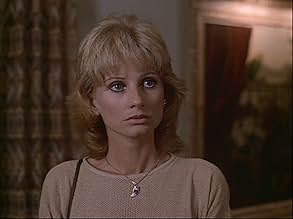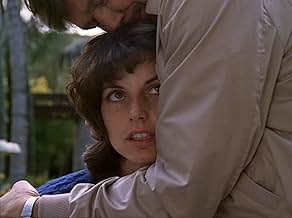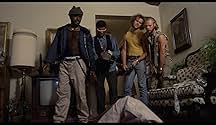AVALIAÇÃO DA IMDb
6,0/10
19 mil
SUA AVALIAÇÃO
O arquiteto Paul Kersey novamente se torna vigilante quando tenta encontrar os cinco punks de rua que assassinaram sua filha e governanta, desta vez nas ruas escuras de Los Angeles.O arquiteto Paul Kersey novamente se torna vigilante quando tenta encontrar os cinco punks de rua que assassinaram sua filha e governanta, desta vez nas ruas escuras de Los Angeles.O arquiteto Paul Kersey novamente se torna vigilante quando tenta encontrar os cinco punks de rua que assassinaram sua filha e governanta, desta vez nas ruas escuras de Los Angeles.
- Direção
- Roteiristas
- Artistas
- Prêmios
- 2 indicações no total
Thomas F. Duffy
- Nirvana
- (as Thomas Duffy)
Laurence Fishburne
- Cutter
- (as Laurence Fishburne III)
- Direção
- Roteiristas
- Elenco e equipe completos
- Produção, bilheteria e muito mais no IMDbPro
Avaliações em destaque
Charles Bronson picks up where he left off in the famous "Death Wish" movie of 1976, going after punks and eliminating them. The only differences: he's moved from New York to Los Angeles and the violence is more graphic.
Despite the B-movie feel to this (produced by the kings of the cheapo movies of that era (70s and early 80s) : Golan/Globus, it still is very enjoyable and satisfying - if revenge is your thing. Here, Bronson revenges the death of his daughter. At least her death is quick and bloodless, unlike the unpleasant rape-and-murder scene in the first film.
Also, unlike the first film there is no need for a long setup. Bronson gets back in his vigilante mode in a hurry here and never lets up. If you want a short dose (an hour and a half) of action, this is your movie. One of the gang members in here, by the way, is a young Laurence Fishburne.
The negatives are (1) sub-par acting performances by Bronson and his real-life wife, Jill Ireland; (2) some blatant credibility problems with the story ( such as how Bronson could get across town all bloody but never be noticed;) and (3) not exactly the most intelligent dialog!
Yet, this is still an appealing movie to our conditioned satisfaction for instant revenge. So, if you've had a bad day and need a release of your hostilities, this is a good remedy!
Despite the B-movie feel to this (produced by the kings of the cheapo movies of that era (70s and early 80s) : Golan/Globus, it still is very enjoyable and satisfying - if revenge is your thing. Here, Bronson revenges the death of his daughter. At least her death is quick and bloodless, unlike the unpleasant rape-and-murder scene in the first film.
Also, unlike the first film there is no need for a long setup. Bronson gets back in his vigilante mode in a hurry here and never lets up. If you want a short dose (an hour and a half) of action, this is your movie. One of the gang members in here, by the way, is a young Laurence Fishburne.
The negatives are (1) sub-par acting performances by Bronson and his real-life wife, Jill Ireland; (2) some blatant credibility problems with the story ( such as how Bronson could get across town all bloody but never be noticed;) and (3) not exactly the most intelligent dialog!
Yet, this is still an appealing movie to our conditioned satisfaction for instant revenge. So, if you've had a bad day and need a release of your hostilities, this is a good remedy!
It's hard to believe that anyone who didn't like the first one wouldn't like this one. Bronson is back, this time avenging the death of his daughter and he's angrier than he's ever been. This one takes more of a action hero approach than the first one, but that's okay, you see, Bronson is a bad ass and that's all that matters. Movies like this aren't made to win best picture or best screenplay, they're made to be entertaining and filled with action, and that's what this is. Bronson has a great line he give to a punk just before he blows him away; he asks the punk if he believes in Jesus as the punk clutches a cross around his neck. The punk says "yes sir" so Bronson pauses and then tells him "you're going to meet him." Then he shoots him twice, it's great. Classic. I found no insight in this film, all I found was an awesome character who you can't get enough of that gets away with killing pieces of trash that rape, mug, and murder civilians. This formula is timeless, and the whole Death Wish series should be appreciated for proving so, because I'd watch one of these films before I watch any action film that may be produced today.
Death Wish 2 is a nasty piece of work, and I mean that in the nicest possible way. There is no pretence about this film, whereas the original Death Wish painstakingly presented Paul Kersey as a victim of violence who had been pushed to breaking point, Death Wish 2 finds him in John Rambo territory, as a borderline crazy person bent on revenge. Unlike the original, Death Wish 2 has no political message and never waivers in its approval of Paul's vigilantism. While this is by no means as good as the original, which I consider to be a minor classic, Death Wish 2 is a great example of the short lived early 80s embrace of ultra violent entertainment before these kind of movies were labelled "video nasties" and expelled from the mainstream.
The main reason why the Death Wish series became increasingly ridiculous is the improbability of one man suffering so much bad luck. This time around a group of thugs break into Paul's home and gang rape his Latina maid. This scene is truly grim and more detailed than most of the more infamous "rape & revenge" movies of the 80s. The scene is particularly distasteful as poor Rosario gets roughed up so much worse than any other female victim in the series - all of whom happen to be white. Unfortunately, I don't think that it is a coincidence, as the entire Death Wish series had dubious racial undertones.
The action becomes increasing twisted when Paul's daughter, Carol, still traumatised from the attack in the original film, is kidnapped and raped. The nastiness of this act stems mostly from the creepy smile on Carol's face. When Carol is subsequently impaled on an iron gate, the transformation from the socially aware film of the 1970s to the sleazy, pure action of the 80s sequel is complete. This time around Paul doesn't even bother with the police, choosing instead to take all of the thugs out himself.
The second half of the film is fairly predictable and a bit slow in comparison with the downright nastiness of the opening half an hour. Paul walks around the streets of LA (he definitely gets around), shooting muggers, rapists and his daughter's attackers. This time around Paul doesn't hesitate shooting anyone and the conflict he demonstrated in the first film is nowhere to be seen. Instead, everyone from civilians to the police comment approvingly on his particular approach to crime control. Needless to say, Death Wish 2 is about as politically incorrect as they come and yet, endearingly of its time.
Michael Winner does a good job of capturing the atmosphere of early 80s LA, with amusing glimpses of religious fanatics, coke dealers and general crazies. The 80s fashion on display is pretty funny and the scene where the thugs dance to their "ghettoblaster" makes me laugh every time. The acting is highlighted by Jill Ireland's extraordinarily wooden turn as Paul's new girlfriend. Her ability to lower the tone of any Charles Bronson movie borders on the supernatural. Lastly, Jimmy Page's soundtrack deserves a mention, it is different to say the least.
If you are looking for cheap, nasty, morally corrupt entertainment, then you should enjoy Death Wish 2. I certainly did.
The main reason why the Death Wish series became increasingly ridiculous is the improbability of one man suffering so much bad luck. This time around a group of thugs break into Paul's home and gang rape his Latina maid. This scene is truly grim and more detailed than most of the more infamous "rape & revenge" movies of the 80s. The scene is particularly distasteful as poor Rosario gets roughed up so much worse than any other female victim in the series - all of whom happen to be white. Unfortunately, I don't think that it is a coincidence, as the entire Death Wish series had dubious racial undertones.
The action becomes increasing twisted when Paul's daughter, Carol, still traumatised from the attack in the original film, is kidnapped and raped. The nastiness of this act stems mostly from the creepy smile on Carol's face. When Carol is subsequently impaled on an iron gate, the transformation from the socially aware film of the 1970s to the sleazy, pure action of the 80s sequel is complete. This time around Paul doesn't even bother with the police, choosing instead to take all of the thugs out himself.
The second half of the film is fairly predictable and a bit slow in comparison with the downright nastiness of the opening half an hour. Paul walks around the streets of LA (he definitely gets around), shooting muggers, rapists and his daughter's attackers. This time around Paul doesn't hesitate shooting anyone and the conflict he demonstrated in the first film is nowhere to be seen. Instead, everyone from civilians to the police comment approvingly on his particular approach to crime control. Needless to say, Death Wish 2 is about as politically incorrect as they come and yet, endearingly of its time.
Michael Winner does a good job of capturing the atmosphere of early 80s LA, with amusing glimpses of religious fanatics, coke dealers and general crazies. The 80s fashion on display is pretty funny and the scene where the thugs dance to their "ghettoblaster" makes me laugh every time. The acting is highlighted by Jill Ireland's extraordinarily wooden turn as Paul's new girlfriend. Her ability to lower the tone of any Charles Bronson movie borders on the supernatural. Lastly, Jimmy Page's soundtrack deserves a mention, it is different to say the least.
If you are looking for cheap, nasty, morally corrupt entertainment, then you should enjoy Death Wish 2. I certainly did.
Be grateful for Michael Winner's sledgehammer sensitivity because it produced this classic.
None of Paul Kersey's (Charles Bronson) remaining family and friends get off lightly in this twisted nightmare of domestic violence, anal rape, vigilante justice and simplistic politics.
For fans of rough justice, the rape of Bronson's Mexican housemaid is truly amazing and eroticized like crazy by Winner's leering direction.
Thomas F. Duffy as Nirvana, the film's lead thug, is really horrible and a joy to behold (in a perverse way).
Led Zeppelin's Jimmy Page provides a rock score that scorches the L.A. imagery and Vincent Gardenia returns as the cop who prefers to look the other way.
A Cannon-backed sleazefest that brings home the groceries if you like eating trash.
Screw GONE WITH THE WIND. This is much more entertaining.
None of Paul Kersey's (Charles Bronson) remaining family and friends get off lightly in this twisted nightmare of domestic violence, anal rape, vigilante justice and simplistic politics.
For fans of rough justice, the rape of Bronson's Mexican housemaid is truly amazing and eroticized like crazy by Winner's leering direction.
Thomas F. Duffy as Nirvana, the film's lead thug, is really horrible and a joy to behold (in a perverse way).
Led Zeppelin's Jimmy Page provides a rock score that scorches the L.A. imagery and Vincent Gardenia returns as the cop who prefers to look the other way.
A Cannon-backed sleazefest that brings home the groceries if you like eating trash.
Screw GONE WITH THE WIND. This is much more entertaining.
The supposed correlation between violence/sexuality in art and violence in reality has been shoved to the forefront of our culture, especially in the past decade, when incidents such as the Columbine massacre confirmed politicians' fears of an unregulated entertainment industry in need of a spanking. In non-fanatical, everyday reality, however, I have come to disagree with the equation above. Some would argue that ugly, violent, nihilistic, and generally misanthropic films like "Death Wish" and its sequels do nothing but contribute to intensifying the more unsavory impulses that lay dormant in the viewer's id.
Yet therein lies the purpose of such rough-edged, unpleasant entertainment. It sparks the id, pummels it into submission, so that when the experience is over, a sigh of relief is uttered.
The original "Death Wish" was a well-done exploitation flick with the professional gloss of an A picture; despite its relatively shallow insight into the murky moral terrain of vigilante justice, it contained an intensely subdued performance by Charles Bronson, and confident direction by Michael Winner.
By comparison, "Death Wish 2" is a typical sequel, taking what the original had and dumbing it down to milk some cash for the franchise. In addition to Bronson (in the role of architect Paul Kersey), a few other characters return to provide at least a superficial connection to the original (Robin Sherwood as his daughter; Vincent Gardenia as the cop that uncovered his identity). The plot is as before: Paul Kersey has begun a new life (courting the cheerfully cardboard Jill Ireland) which is shattered when a gang of punks (including a young Laurence Fishburne) rape and murder his housekeeper and daughter. Unlike the original, no time is spent watching Kersey contemplate his actions; he simply goes to work, and in the process is rendered a stoic killing machine. The characterization/motivation for the punks is given even less thought--they exist for the sole purpose of showing how scummy the scummiest scum of society can be. The film moves from one random encounter to the next, wherein Kersey stumbles across gang members and kills them.
Of course this doesn't sound like highbrow film-making, but "Death Wish 2" never teases the audience with any notions of greatness. In spite of the meager attention given to Kersey's character, we root for him anyway; and in spite of the inexplicably-written punks, we hope for their demise. Michael Winner once again gives the film a gritty yet polished look, though he is clearly directing a flat-out B picture; the pacing is tight (the film runs just under 90 minutes), and the action is competently choreographed (though the romantic subplot provides a respite from the relentless violence, it is shallow and cloying). Jimmy Page's offbeat musical score only adds to the unusual charge this film packs.
In the best-case scenario, "Death Wish 2" is no masterpiece, but the perfect Novocaine to apply after a particularly rotten day. It will numb you into a state of apathy and wash your troubles away (that's a compliment).
Yet therein lies the purpose of such rough-edged, unpleasant entertainment. It sparks the id, pummels it into submission, so that when the experience is over, a sigh of relief is uttered.
The original "Death Wish" was a well-done exploitation flick with the professional gloss of an A picture; despite its relatively shallow insight into the murky moral terrain of vigilante justice, it contained an intensely subdued performance by Charles Bronson, and confident direction by Michael Winner.
By comparison, "Death Wish 2" is a typical sequel, taking what the original had and dumbing it down to milk some cash for the franchise. In addition to Bronson (in the role of architect Paul Kersey), a few other characters return to provide at least a superficial connection to the original (Robin Sherwood as his daughter; Vincent Gardenia as the cop that uncovered his identity). The plot is as before: Paul Kersey has begun a new life (courting the cheerfully cardboard Jill Ireland) which is shattered when a gang of punks (including a young Laurence Fishburne) rape and murder his housekeeper and daughter. Unlike the original, no time is spent watching Kersey contemplate his actions; he simply goes to work, and in the process is rendered a stoic killing machine. The characterization/motivation for the punks is given even less thought--they exist for the sole purpose of showing how scummy the scummiest scum of society can be. The film moves from one random encounter to the next, wherein Kersey stumbles across gang members and kills them.
Of course this doesn't sound like highbrow film-making, but "Death Wish 2" never teases the audience with any notions of greatness. In spite of the meager attention given to Kersey's character, we root for him anyway; and in spite of the inexplicably-written punks, we hope for their demise. Michael Winner once again gives the film a gritty yet polished look, though he is clearly directing a flat-out B picture; the pacing is tight (the film runs just under 90 minutes), and the action is competently choreographed (though the romantic subplot provides a respite from the relentless violence, it is shallow and cloying). Jimmy Page's offbeat musical score only adds to the unusual charge this film packs.
In the best-case scenario, "Death Wish 2" is no masterpiece, but the perfect Novocaine to apply after a particularly rotten day. It will numb you into a state of apathy and wash your troubles away (that's a compliment).
Você sabia?
- CuriosidadesAccording to Michael Winner's biography, Charles Bronson's alcoholic brother often visited the set to borrow money. Bronson was careful not to give him too much in case someone might kill him for it. He was later found dead in a cheap hotel room having been stabbed in the buttocks.
- Erros de gravaçãoKay tells Kersey he will wait three minutes before ringing the security alarm, yet he only waits about a minute or less.
- Citações
Paul Kersey: You believe in Jesus?
Stomper: Yes, I do.
Paul Kersey: Well, you're gonna meet him.
[Paul shoots Stomper dead]
- Versões alternativasThe R-rated US release is heavily edited missing part of the rape scene of the maid and most of the rape scene of Kersey's daughter (and her graphic suicide). The uncut version is available on BluRay.
- ConexõesFeatured in Not for Women Only: Episode dated 15 February 1982 (1982)
- Trilhas sonorasGo, Tell It on the Mountain
Traditional
Performed by the church congregation
Principais escolhas
Faça login para avaliar e ver a lista de recomendações personalizadas
Detalhes
- Data de lançamento
- País de origem
- Idiomas
- Também conhecido como
- El vengador anónimo II
- Locações de filme
- 1716 North Western Avenue, Los Angeles, Califórnia, EUA(Pioneer Chicken where Paul Kersey stares at the punks)
- Empresas de produção
- Consulte mais créditos da empresa na IMDbPro
Bilheteria
- Orçamento
- US$ 2.000.000 (estimativa)
- Faturamento bruto nos EUA e Canadá
- US$ 16.100.000
- Faturamento bruto mundial
- US$ 16.100.000
Contribua para esta página
Sugerir uma alteração ou adicionar conteúdo ausente

Principal brecha
By what name was Desejo de Matar 2 (1982) officially released in India in English?
Responda




